
Chie Nakane was a Japanese anthropologist and Professor Emerita of Social Anthropology at the University of Tokyo.

The Kashmiri Pandits are a group of Kashmiri Hindus and a part of the larger Saraswat Brahmin community of India. They belong to the Pancha Gauda Brahmin group from the Kashmir Valley, located within the Indian union territory of Jammu and Kashmir. Kashmiri Pandits are Hindu Kashmiris native to the Kashmir Valley, and the only remaining Hindu Kashmiris after the large-scale of conversion of the Valley's population to Islam during the medieval times. Prompted by the growth of Islamic militancy in the valley, large numbers left in the exodus of the 1990s. Even so, small numbers remain.

André Beteille, is an Indian sociologist, writer and academician. He is known for his studies of the caste system in South India. He has served with educational institutions in India such as Delhi School of Economics, North Eastern Hill University, and Ashoka University.
The Institute for Human Sciences is an independent institute for advanced study in the humanities and social sciences based in Vienna, Austria.
Mohammad Ishaq Khan was a historian of Kashmir. He was Dean Academics, Dean, Faculty of Social Sciences and Head, Department of History at Kashmir University. After his superannuation in 2005, he became the Director of the newly founded Centre for Kashmir Studies and later held the Shaikhul Alam Chair at Kashmir University until August 2008.
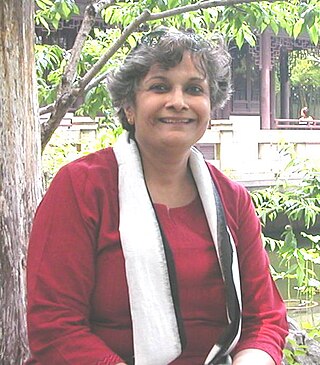
Sujata Patel is an Indian sociologist, currently holding the position of National Fellow at the Indian Institute of Advanced Study.
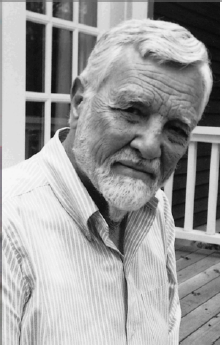
Charles Miller Leslie (1923-2009) was an American medical anthropologist, who was an avid contributor of published works in his branch of anthropology. Leslie’s career was influential to the shaping of medical anthropology, as his works have inspired other medical anthropologists to further research and popularize anthropological concepts which includes medical pluralism, social relations of therapy management, the relationship between state and medical systems, and health discourse. Leslie’s main focus within medical anthropology has been the study of Asian medical systems, specifically Ayurvedic, Unani, and Chinese medicine.
Susan Visvanathan is an Indian sociologist, social anthropologist and a fiction writer. She is well known for her writings on religious dialogue and sociology of religion. Her first book Christians of Kerala: History, Belief and Ritual among the Yakoba is a pathbreaking work in the field of sociology of religion.
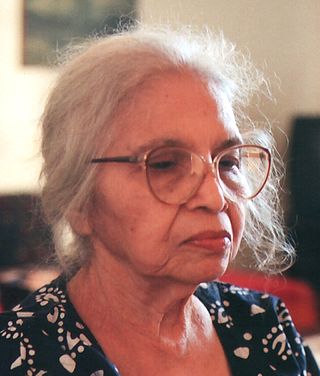
Leela Dube was a renowned anthropologist and feminist scholar, fondly called Leeladee by many. She had been married to the renowned anthropologist and sociologist LateShyama Charan Dube. Leela Dube was the younger sister of the late classical singer Sumati Mutatkar. Her elder son Late Mukul Dube was an avid photographer. She is survived by her younger son, Saurabh Dube. Known for her work on kinship and in women's studies, she wrote several books including Matriliny and Islam: religion and society in the Laccadives and Women and kinship: comparative perspectives on gender in South and South‑east Asia.
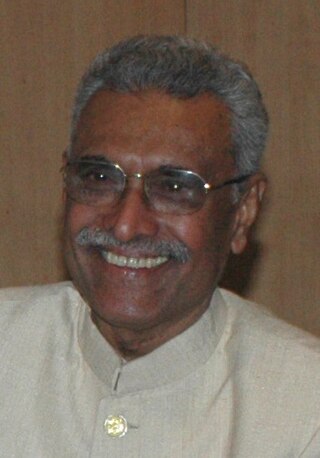
Tharailath Koshy Oommen is an Indian sociologist, author, teacher, and Professor Emeritus at the Centre for the Study of Social Systems, Jawaharlal Nehru University. He was awarded Padma Bhushan, the third highest Indian civilian award in 2008 for his services to the fields of education and literature by the President of India.

The Institute of Economic Growth (IEG) is an autonomous, multidisciplinary Centre for advanced research and training. Established in 1958, its faculty of about 23 social scientists and a large body of supporting research staff focus on areas of social and policy concern.
Harold Alton Gould was an American anthropologist specializing in Indian society and civilization. He is an author of numerous books on various aspects of Indian society including the caste system, religion, politics and international relations.
Gloria Goodwin Raheja is American anthropologist who specializes in ethnographic history. She is the author of several historical works where she explores the concepts of caste and gender in India, colonialism, politics of representation, blues music, capitalism in the Appalachia and other diverse topics. Raheja argues that caste stratification in India was influenced by British colonialism. Monographs on ethnographic history and India have been considered "acclaimed" by the Journal of the Royal Anthropological Institute.
Ramkrishna Mukherjee was a scientist at the Indian Statistical Institute, Kolkata, President of the Indian Sociological Society (1973–75) and recipient of the Indian Sociological Society's Lifetime Achievement Award in 2005.
Amita Baviskar is a sociologist and Professor of Environmental Studies and Sociology & Anthropology at Ashoka University, India. Previously, she was Professor at the Sociology Unit, Institute of Economic Growth, Delhi, India. She received the 2005 Malcolm Adiseshiah Award for Distinguished Contributions to Development Studies, the 2008 VKRV Rao Prize for Social Science Research and, in 2010, was awarded the Infosys Prize for Social Sciences – Sociology in recognition of her analysis of social and environmental movements in modern India. Baviskar studies the cultural politics of environment and development in rural and urban India.

Professor Sanjay Srivastava is a sociologist. He is currently at the Department of Anthropology and Sociology, SOAS University of London. He is visiting fellow at many institutions, including the Institute of Economic Growth, Delhi, India.
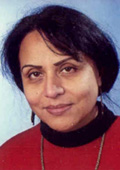
Aparna Rao was a German anthropologist who performed studies on social groups in Afghanistan, France, and some regions of India. Her doctorate studies focused on anthropogeography, ethnology, and Islamic studies. Rao taught anthropology at the University of Cologne, serving for a brief time as chair of the Department of Ethnology at the South Asia Institute of Heidelberg University, Germany.
Georg Pfeffer was a German anthropologist. Born in 1943 in Berlin to a German sociologist father and a British mother, he was schooled in Hamburg. In 1959, he moved to Lahore with his family, and studied at the city's Forman Christian College for 3 years. Later, he moved back to Germany and studied at the University of Freiburg where he also completed his Ph.D.
Rita Brara is an Indian sociologist, professor, author, and the editor of the academic journal Contributions to Indian Sociology.

Baidyanath Saraswati was an anthropologist and an author of many books on Indian culture, religion, and tribal studies. He held the UNESCO Chair in the field of Cultural Development at the Indira Gandhi National Center for the Arts from 1995 – 2002. Saraswati represented the Indian government at the UNESCO meeting in Paris in 1989 on safeguarding folklore, where he served as Vice-Chairman in preparation of a draft recommendation to member states. In 1994, he participated in UNESCO's Barcelona Declaration on the Role of Religion in the Promotion of a Culture of Peace.











